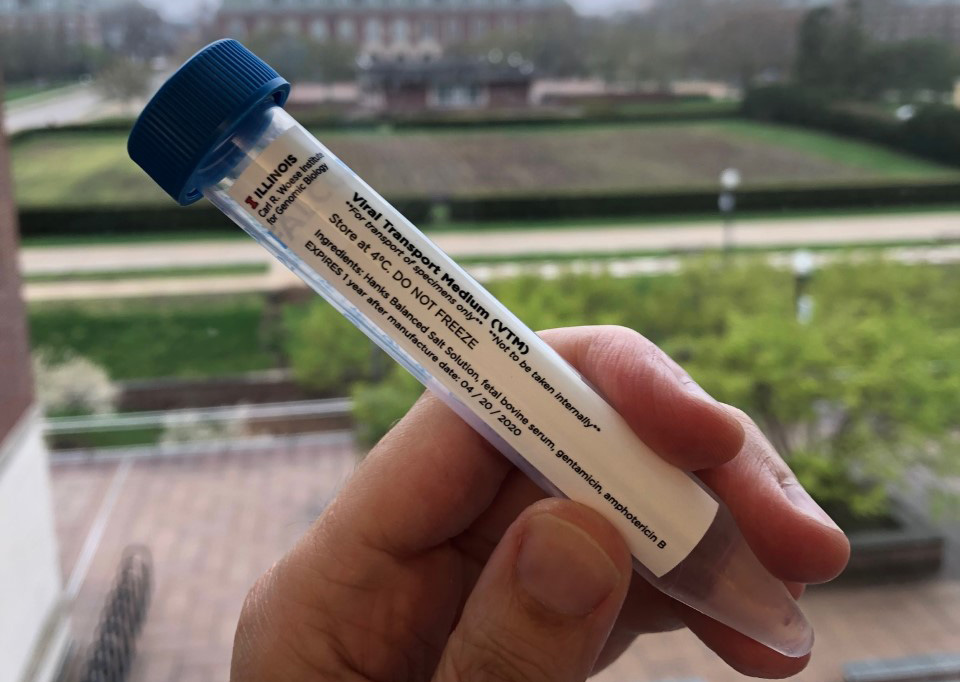Studies indicate that homemade masks help combat the spread of viruses like COVID-19 when combined with frequent hand-washing and physical distancing. Many of these studies focus on the transfer of tiny aerosol particles; however, researchers say that speaking, coughing and sneezing generates larger droplets that carry virus particles. Because of this, mechanical engineer Taher Saif (M-CELS/RBTE) said the established knowledge may not be enough to determine the effectiveness of some fabrics used in homemade masks.
As COVID-19 continues to spread, bottlenecks in supplies and laboratory personnel have led to long waiting times for results in some areas. In a new study, University of Illinois, Urbana-Champaign researchers have demonstrated a prototype of a rapid COVID-19 molecular test and a simple-to-use, portable instrument for reading the results with a smartphone in 30 minutes, which could enable point-of-care diagnosis without needing to send samples to a lab.
Since COVID-19 began its menacing march across Wuhan, China, in December 2019, and then across the world, the SARS-CoV-2 virus has taken a “whatever works” strategy to ensure its replication and spread. But in a new study undergoing peer review, University of Illinois researchers and students show the virus is honing the tactics that may make it more successful and more stable.
A collaborative effort at the University of Illinois to support COVID-19 testing is winding down, but not before it produced enough materials to support some 200,000 coronavirus tests across the state.
A workgroup including Illinois Computer Science professors Mohammed El-Kebir (IGOH) and Jian Peng (CABBI), as co-principal investigators, produced a preprint research paper serving as the “first comprehensive analysis at a large scale that attempts to identify genomic signatures of SARS-CoV-2 strains that occur
On June 3 the IGB will begin a limited re-opening. Modifications have been made to the building, and adjustments must be made to daily routines. These will be in place for the conceivable future and will evolve as new knowledge and best practices come to light. These new measures are designed for the sake of protecting the health of the entire IGB community. Among the most crucial to follow are:
As we all adjust to new health recommendations and wellness practices we may be finding ourselves at home much more than ever before. Here at the IGB we want to connect with communities both locally in Urbana-Champaign and across the globe. We will be posting fun and educational activities or suggestions to help enjoy this time together and to engage with each other, and to provide some opportunities to learn something new, experiment with a fresh idea, or just be curious.
Three Nick Holonyak Jr., Micro and Nanotechnology Lab (HMNTL) and IGB faculty members have received NSF Rapid Response Research (RAPID) program grants, all of which aim to shorten the amount of time it takes to process a COVID-19 test. Current tests can take as long as five days for results to be returned to the patient. Although more rapid nucleic acid tests that can give a result within an hour have become available, there are reports of a high rate of false negatives among these tests.

Most viral test kits rely on labor- and time-intensive laboratory preparation and analysis techniques; for example, tests for the novel coronavirus can take days to detect the virus from nasal swabs. Now, researchers have demonstrated an inexpensive yet sensitive smartphone-based testing device for viral and bacterial pathogens that takes about 30 minutes to complete. The roughly $50 smartphone accessory could reduce the pressure on testing laboratories during a pandemic such as COVID-19.

